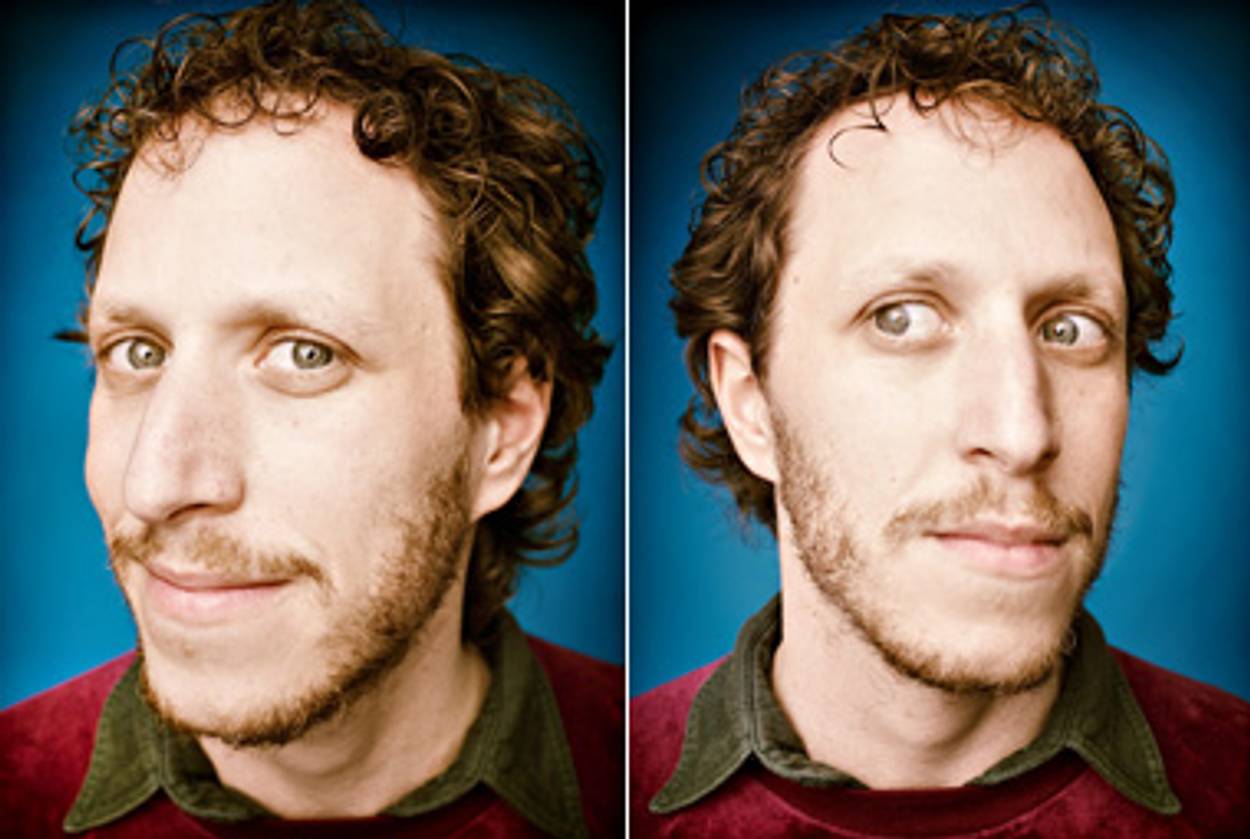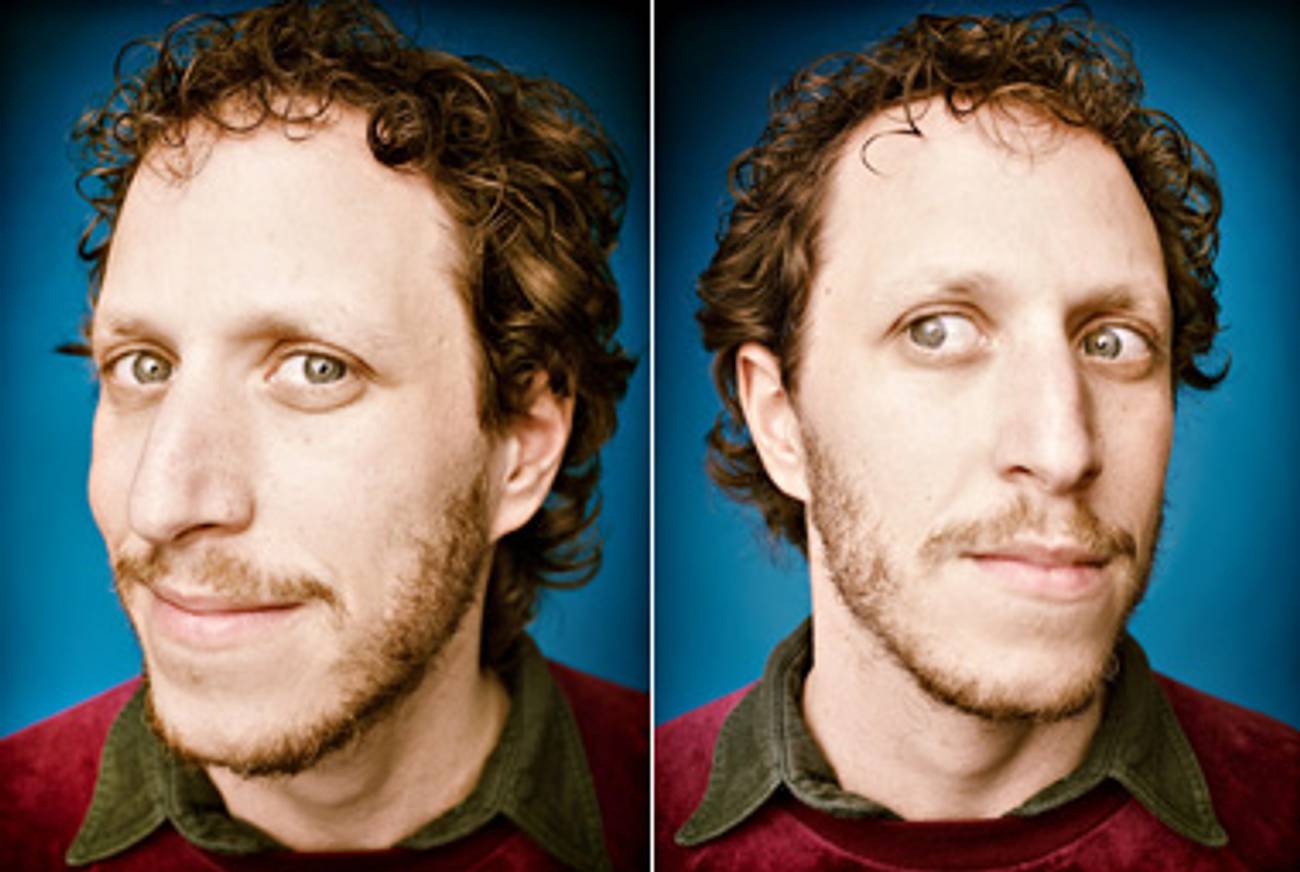Dutch Treat
On the eve of his New York debut, an Amsterdam comedian reflects on Jewish funniness, the liberalism of the Netherlands, and Sarah Silverman. Plus a video preview.




I am standing in front of the Soho Playhouse in Manhattan, at the corner of Sixth Avenue and Vandam Street, waiting for a signal to take a bite out of the big red apple I am holding in my right hand. A photographer thought it would be fun to take a picture of me taking a bite out of an apple in front of the Big Apple theater where I will be performing my one-man show later this week. It seems I have come all the way to New York only to be interviewed for a Dutch newspaper. With only eight tickets sold in advance, in a city that holds eight million potential buyers, I wonder how big my bite must be to do the metaphor justice.
After the picture is taken, Babette, who flew to New York to interview me, takes me to a café and asks what has made me decide to give up the comfort of Dutch theaters do a comedy show in a second language. So, I explain to her that most all my comic heroes are from the United States: Larry David, Garry Shandling, Woody Allen, Richard Pryor, Doug Stanhope, Jon Stewart, Sarah Silverman—comedians who not only make you laugh but make you feel uncomfortable in the process. What I wanted to do is see if my stand-up would work in the country that most inspired it.
“They’re all Jewish,” Babette notes.
“Doug Stanhope and Richard Pryor aren’t,” I say, trying to steer the interview away from where I fear it is going. But it’s too late. Once again I am the Jewish comedian, asked to explain why Jews are so funny. It’s a topic that has come up in every interview since my career in the Netherlands began. Every time I explain that I don’t think being Jewish matters that much to who I am and that I am not so sure Jews are that much funnier. The way I see it, Jews being funny is a stereotype, one that’s only made more dangerous because so many Jews choose to believe in it themselves.
“When Israel bombs a village in Gaza, for example, you never hear how funny the Jews are,” I say, hoping to shock her a little. But Babette doesn’t let me get away that easily. She wants to know how I explain it, then, that there are so many good Jewish comedians. I reply that there are even more horrible Jewish comedians, but most people have never heard of them, precisely because they are so horrible. But that, she says, still does not explain why there are so many good Jewish comedians. Yes, I think, and those good Jewish comedians must be really tired of being asked whether it’s being a Jewish that made them funny.
“Maybe,” I say, “that’s why I came to New York—to experience what is feels like to be just a comedian, not the Jewish comedian people make me out to be in the Netherlands.”
“So, you did come to New York because you are a Jew,” Babette parries.
“Well,” I say, “if my comedy is about one thing it’s about being suspicious of people who claim they have an identity. When I was growing up in Maarn, a small village in the center of Holland, the only Jews I knew were my parents. Naturally, I thought that everything that set us apart from them could be attributed to our being Jews. So, when our neighbor had a fever blister, something I had never seen before, I was convinced it was not a very Jewish thing to walk around with.”
Only when my parents were on sabbatical and took us to live in New York did I realize that I had just as little in common with the Jewish children in my New York public school. It’s a lonely feeling to realize you have little in common with anybody. But when you accept it, it’s actually not that bad. You are, after all, not the only one who knows he is alone.
“So, is that the reason you called your show Amsterdam Abortion Survivor?” Babette asks.
“Yes,” I say, knowing full well that she actually never asked me this question, but for the purposes of this little story it’s just too good a question not to answer. “I just love the idea that Holland has this image as being such a liberal country. Just like Jews aren’t necessarily funny. The Dutch, actually, have quite a terrible track record when it comes to being open-minded. With the recent success of the Islamophobic populist politician Geert Wilders a new chapter of conservative bigotry was added to our country’s history. It’s one of the things I’ll be talking about in my New York show.
“And the ‘survivor’ bit?” Babette proceeds not to ask me.
“Well, if there is only one thing I find more dangerous than people choosing an ethnicity to hide behind, it’s the identity of victimhood. More and more people seem to define themselves as victims. It sometimes seems that to some people there even is a romantic side to being a Holocaust survivor. That to me is so obscene, it begs to be satirized.”
After the interview is over, I go back to my sublet to discover that five more tickets have been sold, bringing me to a grand total of 13.
To comfort myself I start reading Sarah Silverman’s hilarious new autobiography. I am elated to read that, just like me, she grew up in a town almost without Jews, she loves farts, and, just like me, owes her fame partly to a national controversy sparked by someone who refused to see a joke for what it was. “Wow,” I think while turning the pages, “if only Sarah would come to see my show.”
And then in the last chapter, Sarah tells the reader she is single! Sarah Single Silverman! By now I am sure we would hit it off right away. Why? Obviously we’re both Jewish.
Micha Wertheim’s one-man show, Amsterdam Abortion Survivor, is being performed as part of the New York International Fringe Festival, tonight through August 27.